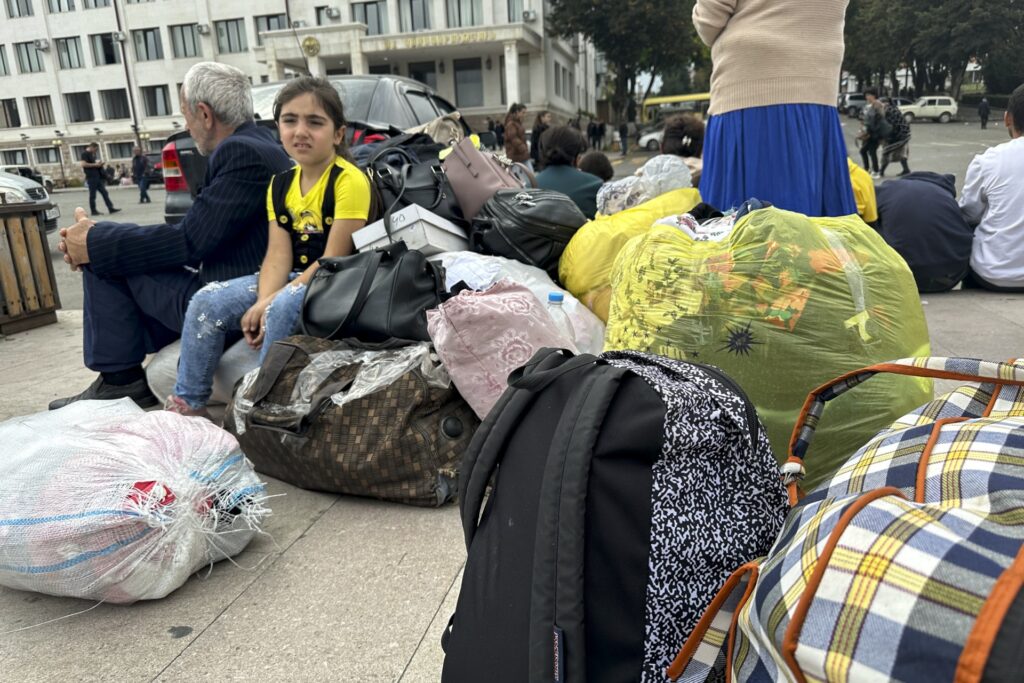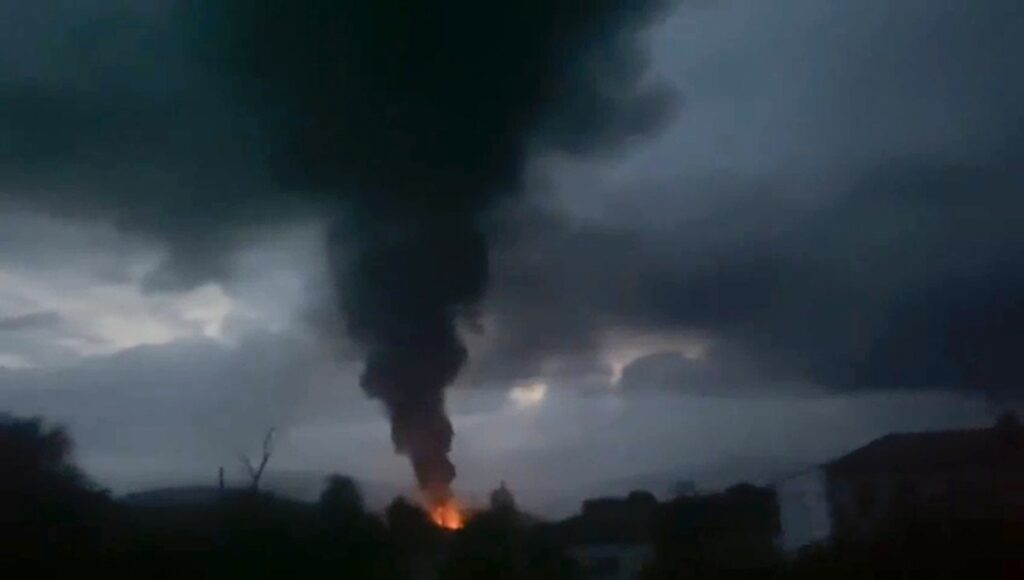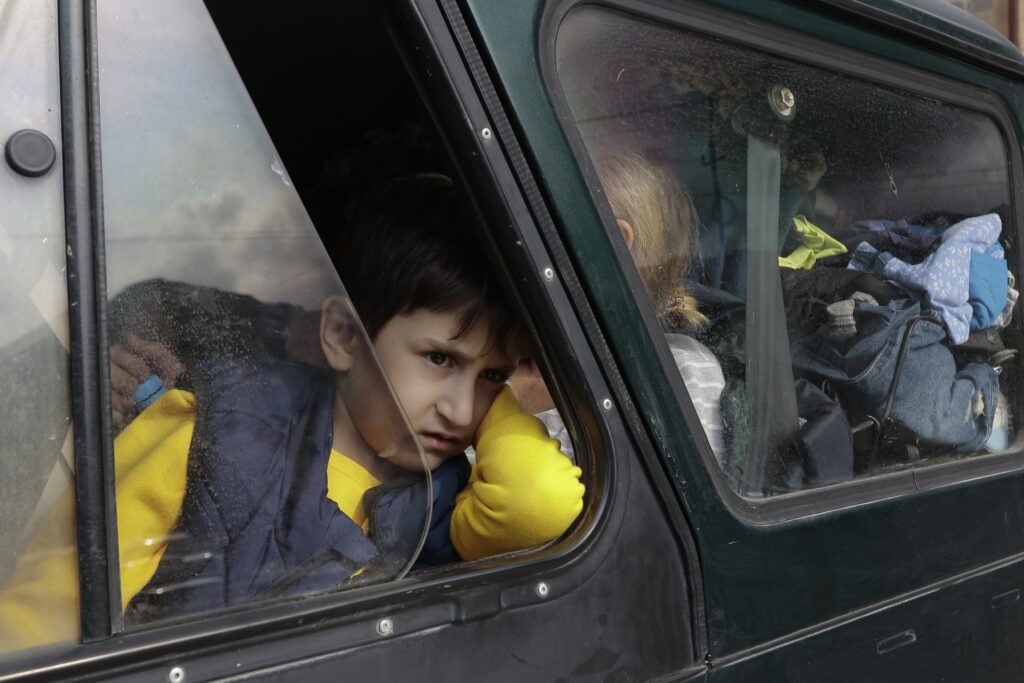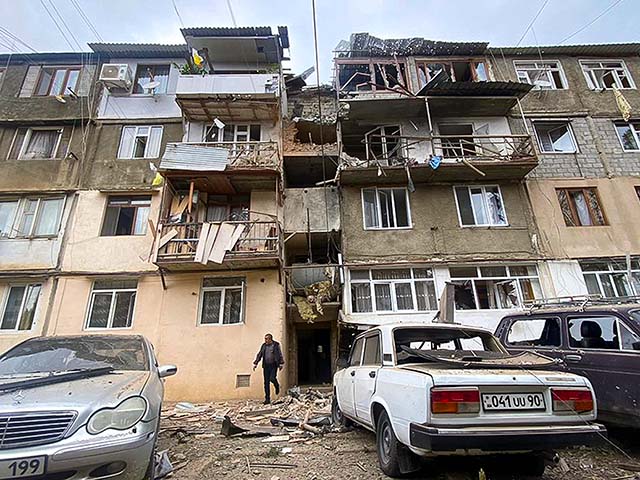The separatist government of Nagorno-Karabakh announced its own dissolution on Thursday, ceding total control of the region to Azerbaijan after surrendering to a swift and overwhelming Azeri assault two weeks ago.
More than half of the ethnically Armenian population of the region is reportedly fleeing despite Azerbaijan’s promises of safety.

Ethnic Armenians gather in hope to leave Nagorno-Karabakh region for Armenia in the center of Stepanakert, Nagorno-Karabakh on Monday, September 25, 2023. (AP Photo/Ani Abaghyan)
Nagorno-Karabakh is a mountainous region that fell within the borders of Azerbaijan after the Soviet Union collapsed, even though Armenians had lived there for centuries. The Armenians are a majority Christian population, while most Azeris are Muslim, though their government claims to be secular.
Frequent clashes over control of the region persisted until a full-blown, but brief, war between Azerbaijan and Armenia broke out in 2020. The conflict was noteworthy as a landmark in the evolution of drone warfare, as Azerbaijan made devastating use of Turkey’s Bayraktar TB2 combat drones.
The Armenian separatist government in Nagorno-Karabakh survived Azerbaijan’s victory in 2020, another round of skirmishes in 2022, and Azerbaijan’s blockade of the only road to Armenia in December 2022.
This month, Azerbaijan launched a massive assault it billed as an “anti-terrorist” operation, spurred by the Armenian separatists allegedly killing a half-dozen Azeri soldiers and civilians with landmines. Armenia denounced the assault as an attempt at “ethnic cleansing” and reported Azeri artillery fire against civilian targets.
Armenia pleaded with Russia to use its “peacekeepers” in the region to halt the attack, but Russia demurred, and within 24 hours the Armenians of Nagorno-Karabakh were forced to surrender.

This grab taken from video distributed by Siranush Sargsyan’s Twitter account on Monday, Sept. 25, 2023, shows smoke rising after a fuel depot explosion near Stepanakert, Nagorno-Karabakh. Several dozen people were injured on Monday night at a gas station just outside of the breakaway region’s capital, Stepanakert, where a fuel tank exploded. Dozens of people were lining up at the gas station at the time to fuel their cars in order to move to Armenia. (Siranush Sargsyan’s Twitter account via AP)
On Thursday, the president of the separatist government, Samvel Shakhramanyan, signed a decree that effectively ended the three-decade history of the “Republic of Artsakh,” the Armenian name for the Nagorno-Karabakh region.
The decree stated that all government entities in Karabakh would dissolve by the end of 2023. Residents were allowed to choose if they wanted to stay and live under the rule of Azerbaijan. Well over half of them quickly chose not to.
Shakhramanyan’s decree mentioned Azerbaijan’s promise of “free, voluntary, and unhindered movement” for all Karabakh residents in the September 20 agreement that concluded the Azeri offensive. There does not appear to be a great deal of trust in that promise among the departing Armenians.p

An ethnic Armenian boy from Nagorno-Karabakh, looks on from a car upon arrival in Armenia’s Goris, the town in Syunik region, Armenia, Monday, September 25, 2023. Thousands of Armenians have streamed out of Nagorno-Karabakh after the Azerbaijani military reclaimed full control of the breakaway region last week. (AP Photo/Vasily Krestyaninov)
“We can never go back to our homes without having an independent government in Artsakh,” one refugee told the Associated Press (AP) on Thursday.
“No power in the world is willing to stop the atrocities of Azerbaijan. What can any Armenian hope for under the control of that genocidal state?” said another.
The AP reported that over 65 percent of the 120,000 people living in Nagorno-Karabakh fled to Armenia as of Thursday afternoon.
“In the coming days, there will be no Armenians left in Nagorno-Karabakh,” predicted Armenian Prime Minister Nikol Pashinyan.

A damaged residential apartment building following shelling is seen in Stepanakert, Nagorno-Karabakh. Azerbaijan on Tuesday, Sept. 19, 2023, declared that it started what it called an “anti-terrorist operation” targeting Armenian military positions in the Nagorno-Karabakh region and officials in that region said there was heavy artillery firing around its capital. (AP Photo/Siranush Sargsyan)
“This is a direct act of an ethnic cleansing and depriving people of their motherland, exactly what we’ve telling the international community about,” Pashinyan said, describing all of the refugees as “forcibly displaced.”
“Pashinyan knows well enough that the current departure of Armenians from Azerbaijan’s Karabakh region is their personal and individual decision and has nothing to do with forced relocation,” Azerbaijan’s Foreign Ministry retorted.
Azerbaijan accused Pashinyan’s government of “seeking to disrupt Azerbaijan’s efforts to provide humanitarian assistance and the reintegration process,” in order to keep the ethnic cleansing narrative going.
The New York Times (NYT) interviewed some Nagorno-Karabakh refugees who said they did not even feel safe in Armenia, and planned to keep going until they reached Russia.
On Monday, a fuel depot in the Nagorno-Karabakh capital of Stepanakert exploded, killing at least 68 of the people who were thronging the depot looking for gas. Almost 300 people were admitted to hospitals for treatment, some of them ferried by Russian peacekeepers.
Azerbaijan said it has delivered 70 tonnes of food to Nagorno-Karabakh since the September 20 capitulation, and it plans to send a second convoy with 40 more tonnes of supplies. Azeri officials urged residents to remain in their homes instead of fleeing to Armenia and beyond.
“What should Azerbaijan do? We cannot keep them by force, we don’t want to keep anyone by force, (but) we don’t encourage anyone to leave,” Elin Suleymanov, Azerbaijan’s ambassador to the United Kingdom, said on Thursday.
“We would prefer for people at least to be in a position to make a more informed decision on whether they want to stay. So far, Azerbaijan has not had any chance to prove anything because the time was very short,” Suleymanov said.


